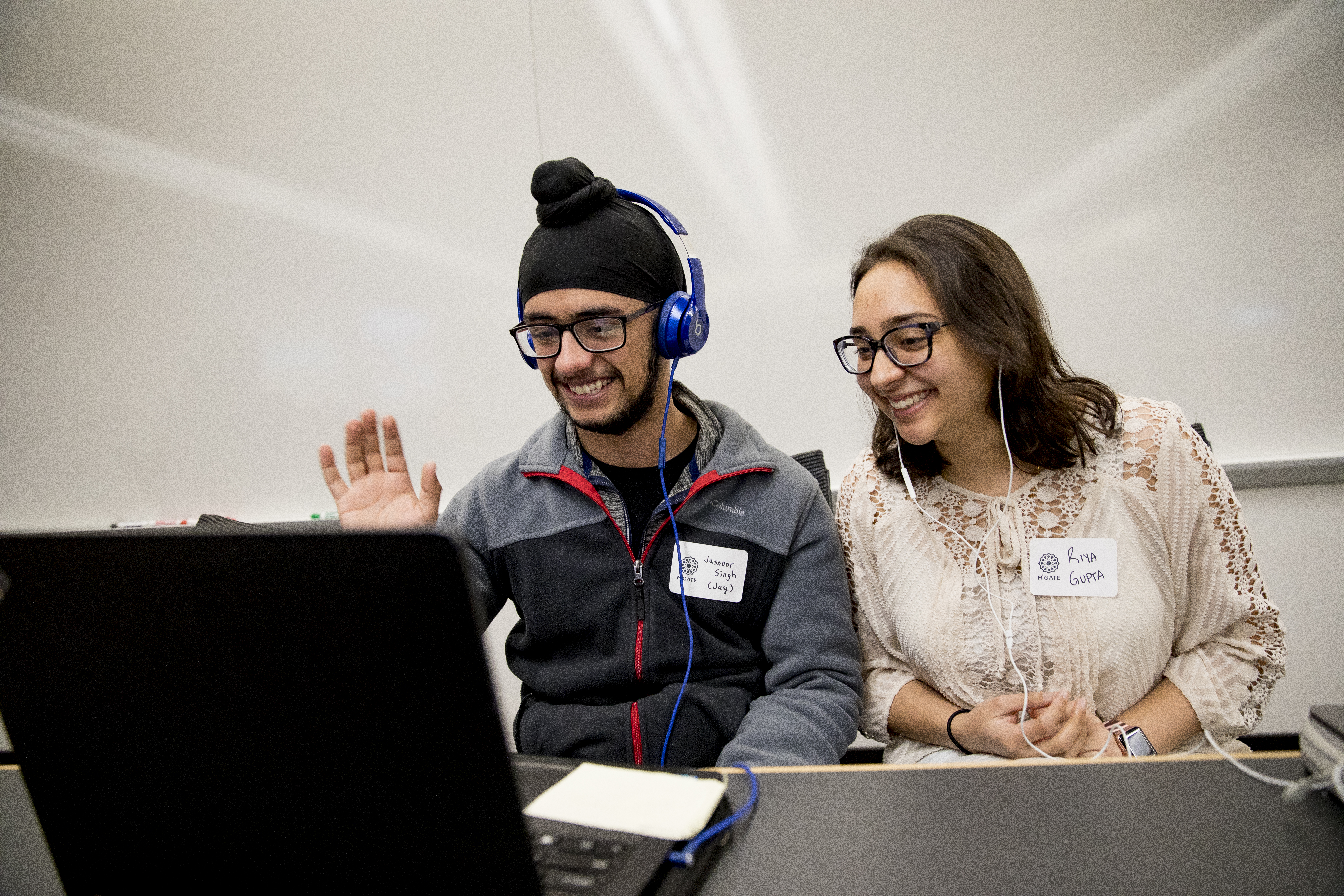
Cross-cultural relationships in business can be challenging, but students adept at navigating them are far more likely to excel in business— not to mention a host of other global professions and fields.
A unique course, offered at the Ross School of Business and facilitated by WDI, will equip students with the skills they need to work on cross-cultural, geographically dispersed teams so common in today’s business world. Open to all majors, the course uses technology to connect U-M students with their peers in Egypt, Lebanon and Libya.
Business & Culture: A Virtual Practicum (BA310), a new 14-week, three-credit course, will serve up a mix of traditional classroom sessions and hands-on, experiential activities. The innovative course will be offered in the winter 2020 semester and most students may register through Wolverine Access now.
The course will increase students’ awareness of the scope and nature of cross-cultural business and allow them to apply their new knowledge through work in international teams. It will be led by Ross Clinical Assistant Professor and WDI Faculty Affiliate John Branch, along with professors from American University in Cairo and American University in Beirut and the founder of the Benghazi Youth for Technology and Entrepreneurship in Libya.
“Success in business, and increasingly also in life in general, requires cultural competence—the ability to navigate culturally awkward situations, respect for alternative worldviews and the skills to lead people who are different,” Branch said. “Arguably, when it comes to developing cultural competence, nothing can replace a cross-cultural experience living, studying, or working abroad.”
But Branch said today’s interconnected world allows a simulation of a cross-cultural experience.
“Using the internet and other technologies, it enables students from four countries to work and study together,” he said. “They will ‘attend’ course sessions together, studying cases which reveal unique cultural approaches to business.”
Students will maintain a journal filled with their cultural reflections and also participate in an online discussion forum with their international peers where ideas, opinions and questions are shared. For the final project, students will form international teams and research and plan the internationalization of a fictitious company.
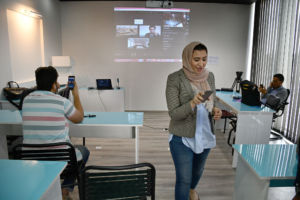
The course is expected to run four times beginning winter 2020. It builds off WDI’s successful project from 2017 and 2018, the MENA-Michigan Initiative for Global Action Through Entrepreneurship (M²GATE) program. That project brought together more than 400 students from five Michigan university campuses, including U-M, and their peers in Egypt, Libya, Morocco and Tunisia. M²GATE and the Business & Culture course were both supported by the Stevens Initiative, which is sponsored by the U.S. Department of State, with funding provided by the U.S. Government, and is administered by the Aspen Institute. The Stevens Initiative is also supported by the Bezos Family Foundation and the governments of Morocco and the United Arab Emirates.
In addition, WDI’s Performance Measurement and Improvement (PMI) will evaluate the impact the program has on students in the U.S., Libya, Lebanon and Egypt in areas such as empathy and cross-cultural skills, and use the findings to look for ways to improve subsequent BA310 classes. The data from the PMI team’s work also will be used to optimize future virtual exchange courses.
“Virtual exchange is an ideal way to prepare students for the global workforce they’ll soon be part of,” said Amy Gillett, academic advisor of the new program and vice president of WDI’s Education sector. “It’s also a fun and exciting way to learn and a great way to build an international network.”
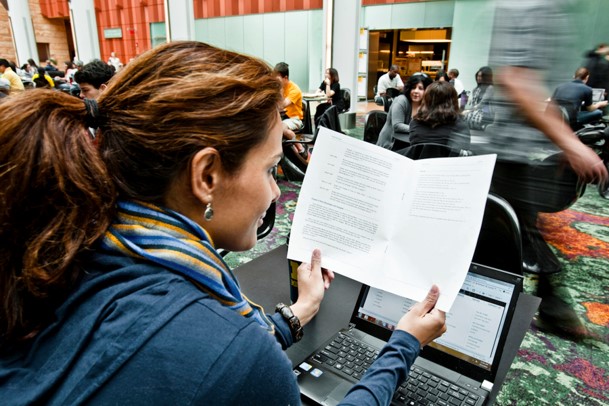
WDI Publishing is organizing a new competition for case studies focusing on the unique advantages and challenges of doing business in the Middle East and North Africa (MENA) region.
Submissions for the competition, “Doing Business in the Middle East, North Africa Region,” should focus on a business dilemma of an organization or company located or doing business in the MENA region. The cases may feature a small or large organization, private sector multinational, non-governmental organization (NGO) or nonprofit.
The global competition is open to individual students or student teams, as long as they enter in collaboration with a faculty member from a degree-granting university or college. Faculty or faculty teams may also enter as long as they are currently teaching at a degree-granting university or college. Other individuals may also enter, provided they do so in collaboration with a faculty member from a degree-granting university or college.
The winning entry will be awarded $5,000. Second place will earn $3,500 and third place $1,500. Additionally, all three winning cases will be published by WDI Publishing and added to its case catalogue. Entry forms are due Dec. 12, 2019, and the final case and teaching note must be turned in by Feb. 9, 2020. Winners will be announced on March 20, 2020.

To learn more about key deadlines, entry requirements, judging criteria and to access entry forms and submission documents, click here. For resources on how to write a case study and a teaching note, along with other helpful information, click here.
WDI Publishing has assembled an impressive panel of judges for the competition. They are:
Kim Bettcher – Center for International Private Enterprise (CIPE)
Andrew J. Hoffman – University of Michigan Ross School of Business
Manel Khadraoui – University of Tunis/Tunis Business School
Hagop Panossian – American University of Beirut Olayan School of Business
WDI Publishing Manager Sandy Draheim said she hopes the competition will encourage the development of new, academic case studies about the MENA region, increase the understanding of doing business there and grow the critical thinking skills of university students in these countries through the use of these new MENA-focused cases.
“There are many regions of the world that could use more ‘localized’ business case studies for higher education,” Draheim said. “But, partly based on the incredible response, interest and results of WDI’s M²GATE program, we thought it would be interesting to target our first geographically-themed case competition around MENA issues. We want to elevate the quality and quantity of teaching materials that provide students – both in the MENA region and around the world – with opportunities to take on the roles and responsibilities of managers in organizations located or doing business in this region.”
WDI is a collaborative, multi-disciplinary organization. As a result, it often engages multiple sector and services teams in our work. The following project undertaken by both our Education sector and Performance Measurement and Improvement service demonstrates our holistic approach. The Education sector implemented Business & Culture: A Virtual Practicum — a classroom-to-classroom, action-learning course on international business cultures that brings together undergraduate students from Egypt, Libya and the U.S., supported by the Stevens Initiative. The course ran five times at the Ross School of Business, starting in Winter 2020. Participants attended lectures by international faculty, worked on interregional teams through synchronous and asynchronous exchange, employed field research methods to learn about one another’s business cultures and created a final project that captured their cross-cultural learnings. The program equipped young people in the U.S. and MENA region with the necessary competencies to communicate, problem-solve and collaborate in a global team environment—all essential 21st century skills in an interconnected world. The Education sector collaborated with the Performance Measurement and Improvement service, which led the design and implementation of an impact evaluation of the program on students in the U.S., Libya, Lebanon and Egypt. In addition to assessing the impact of the program on student outcomes (e.g. empathy, cross-cultural communication skills, business skills and knowledge), the data was used to improve the course and develop generalizable knowledge on how to increase the impact of virtual exchange courses.
WDI has produced a new video that highlights its work on the successful M²GATE program that connected more than 400 students from five Michigan college campuses and their peers in four Middle East and North Africa (MENA) countries through virtual exchange.
The video, titled “WDI’s M²GATE Program: Virtual Learning, Real World Impact,” features interviews with students from Michigan, Libya and Morocco, a mentor from Libya and scenes of student team planning sessions in Michigan, Libya and Tunisia. There also is footage from the final pitch competition that came at the end of the program.
M²GATE, short for MENA-Michigan Initiative for Global Action Through Entrepreneurship, used virtual exchange to bring together the Michigan students with those in Egypt, Libya, Morocco and Tunisia. Teams worked virtually to develop social entrepreneurship projects and accompanying pitches over an eight-week period with the help of instructors, mentors and successful entrepreneurs from MENA and Michigan.
At the end of each of the three cohorts, the program hosted a virtual competition with judges naming winners based on each team’s video that pitched their scalable solution. The winning team from each cohort then traveled to Ann Arbor to participate in a live pitch competition at the University of Michigan.
The program increased cross-cultural understanding and equipped young people with the skills needed to thrive in a 21st century economy, such as entrepreneurship, team building, innovation and design thinking, international business, problem solving and critical thinking. (Read more about the program’s impact here.)
Designed and managed by the Institute throughout 2017-2019, M²GATE was funded by the Stevens Initiative, an international effort to build global competence and career readiness skills for young people in the United States, the Middle East and North Africa. The Stevens Initiative is sponsored by the U.S. Department of State and administered by the Aspen Institute. The Stevens Initiative is also supported by the Bezos Family Foundation and the governments of Morocco and the United Arab Emirates.

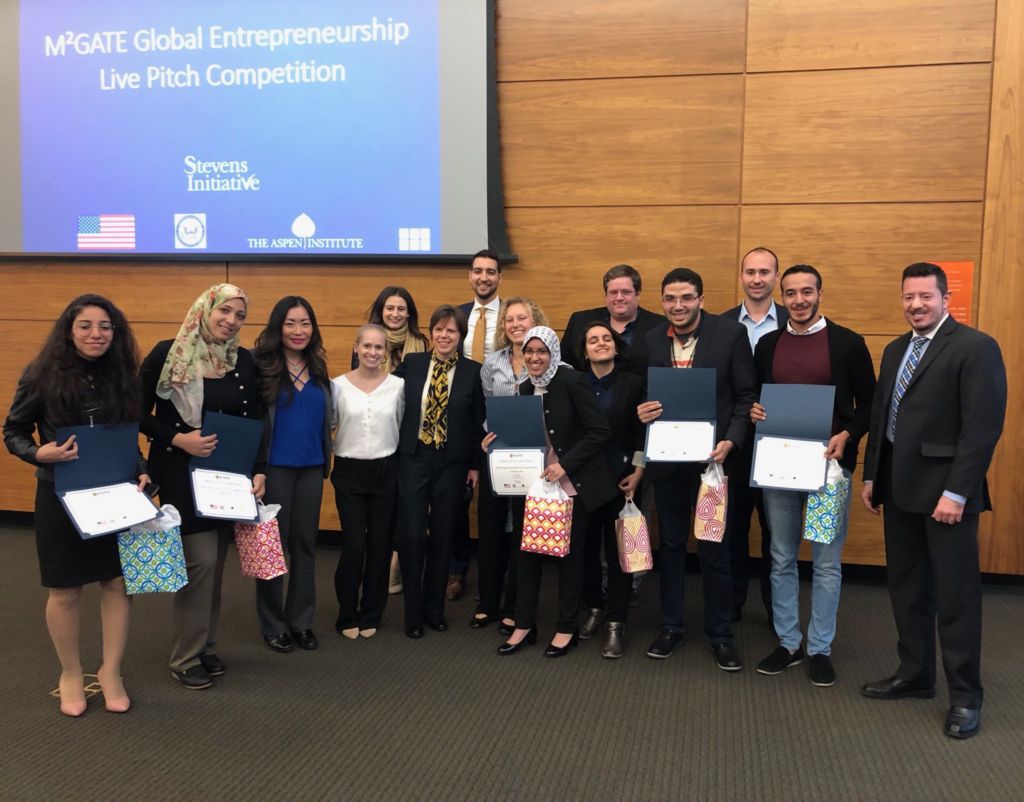 WDI designed an innovative virtual exchange program using modern technologies to give students an exciting real-world learning experience.
WDI designed an innovative virtual exchange program using modern technologies to give students an exciting real-world learning experience.
The latest WDI Impact Report, “Building Bridges Through Virtual Collaboration,” chronicles how WDI utilized the latest virtual learning tools to bridge the gap between countries, communities and cultures and bring students together solve real-world problems while also honing the 21st century skills they need to excel in the modern workplace. (You can read a “flip book” version of the report here.)
The MENA-Michigan Initiative for Global Action Through Entrepreneurship program – M²GATE for short – brought together more than 400 students from five Michigan university campuses and their peers in Egypt, Libya, Morocco and Tunisia to find entrepreneurial solutions to social challenges in the Middle East and North Africa (MENA) region.
“M²GATE graduated more than 400 students in five countries and deeply touched their lives,” said Amy Gillett, vice president of Education at WDI and academic director of M²GATE. “For many, the program was transformative. The impact report explores this in detail and serves as a valuable resource for other institutions contemplating a virtual exchange.”
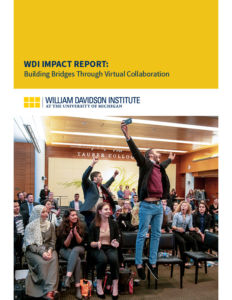 For the program, all teams worked virtually to develop social entrepreneurship projects and accompanying pitches over an eight-week period with the help of instructors, mentors, and successful entrepreneurs from MENA and Michigan. WDI believes entrepreneurship is a crucial catalyst of economic growth and an effective way to cure society’s ills, which is why it was the focus of the program.
For the program, all teams worked virtually to develop social entrepreneurship projects and accompanying pitches over an eight-week period with the help of instructors, mentors, and successful entrepreneurs from MENA and Michigan. WDI believes entrepreneurship is a crucial catalyst of economic growth and an effective way to cure society’s ills, which is why it was the focus of the program.
At the end of each of the three cohorts, the program hosted a virtual competition with judges naming winners based on scalable solutions. The winning team from each cohort then participated in a Nov. 14 pitch competition at the University of Michigan.
M2GATE is supported by theStevens Initiative, which is sponsored by the US Department of State and administered by the Aspen Institute. The Stevens Initiative is also supported by the Bezos Family Foundation and the governments of Morocco and the United Arab Emirates.
“The Stevens Initiative’s virtual exchange programs foster meaningful cross-cultural interactions and relationships while also honoring the legacy of Ambassador Stevens,” Gillett said. “We were privileged to play a role in advancing this mission with the M²GATE program. ”
This is the third impact report in an ongoing series that detail the long-term impact WDI is having in certain sectors or geographies. The first WDI Impact Report, “Improving Business Education in the Philippines,” examined the Institute’s contributions to the five-year STRIDE project that focused on strengthening the science, technology, research and innovation capacity on the island nation.
The second WDI Impact Report, “Positive Change Through Actionable Metrics,” followed the work of the Institute’s Performance Measurement & Improvement group while pilot-testing a new framework in Brazil, Nicaragua and Peru designed to increase the impact of small, inclusive businesses and their distribution networks.
View the eBook Download the PDF
WDI’s M²GATE program, which brought together more than 500 students from five Michigan university campuses and their peers in Egypt, Libya, Morocco and Tunisia to find entrepreneurial solutions to social challenges in the Middle East and North Africa (MENA) region, culminated Nov. 14 with three teams participating in a pitch competition.
The team EcoMENA, comprised of five students from Egypt and two U-M undergrads, was named the winner by a panel of judges. Their project proposed working with the zabaleen, or garbage collectors, in Cairo to help them turn the recycled materials they collect into jewelry and other products they can sell. This would reduce the amount of plastics and metal burned or dumped into landfills, and also help some of the zabaleen earn extra income. (Below is EcoMENA’s pitch video.) EcoMENA team members include Egyptian students Amira Nour Soudky Dawoud, Mohamed Ashraf Abdelaleim Hassan, Naglaa Ibrahim Hussein Ali, Omar Aboutaleb and Samar Mohamed Taha Zaatar; and U-M students Annahita Akbarifard and Jackie Spryshak.
The other two finalist teams were “The Alters,” a team from Morocco that proposed an after-school program to improve the soft skills of students, and “Kaizen,” a Tunisian team that wanted to encourage more recycling in the country by rewarding people who did.
For the MENA-Michigan Initiative for Global Action Through Entrepreneurship (M²GATE) program, all teams worked virtually to develop social entrepreneurship projects and accompanying pitches over an eight-week period with the help of instructors, mentors, and successful entrepreneurs from MENA and Michigan. At the end of each of the three cohorts, the program hosted a virtual competition with judges naming winners based on scalable solutions featuring science, technology, engineering, and math – or STEM-based – innovations. The winning team from each cohort then participated in the pitch competition at U-M.
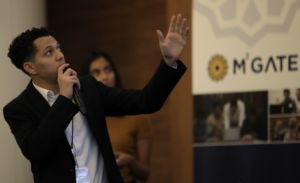
“The Alters” team member Anas Ettayea.
At the Nov. 14 event, each team had about 5-7 minutes for their presentation before a panel of four judges that included Ross School entrepreneurship professors and startup consultants.
EcoMENA team member Naglaa Ibrahim Hussein Ali said the team at times had its ups and downs as they put together the proposal and pitch. But in the end the team “came up with the best pitch we can do” and in the end, “we love each other.”
She said she never imagined the team would win and was very happy that they did.
“I won’t ever forget this experience,” she said.
Another team member, Mohamed Ashraf Abdelaleim Hassan, said he enjoyed spending the week with the teams from Morocco and Tunisia and the friendships they developed. He said he had participated in other pitch competitions in school in Egypt but this was the first time he ever won.
He said he will use his M²GATE experience as he continues his engineering and social enterprise studies at the American University in Cairo.
“This program was beneficial to me, it was useful for me and the other students,” he said.
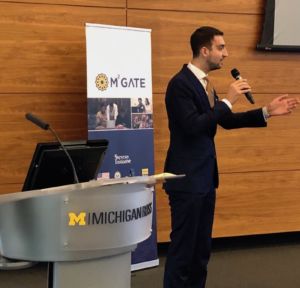
Mohamed Abdel-Kader.
U-M Dearborn senior Annahita Akbarifard said she signed up for the program on a whim and was glad she did. She said the program taught her to be better organized and improved her time management skills. She said it could be difficult to arrange times to video chat with her Egyptian teammates due to different time zones and other conflicts.
Akbarifard said it has been enjoyable getting to know her teammates better this past week.
“Sometimes when we would video chat I wouldn’t see their faces because the screen was blank,” she said. “Now seeing them in person, I’m like, ‘Oh you’re the person I emailed 50-plus times.’”
Ross School of Business Dean Scott DeRue said the M²GATE program is an opportunity for students to learn how to have a positive impact through business, entrepreneurship and social enterprise projects.
“This program is a hallmark of what we try to do at the University of Michigan, which is working across boundaries to bring people together to work to address the opportunities and challenges that we all face in our global society,” he said.
The program was funded by the Stevens Initiative, an international effort to build global competence and career readiness skills for young people in the United States, the Middle East and North Africa. The initiative honors the legacy of U.S. Ambassador Chris Stevens, who devoted his life to building bridges between people from different cultures.
Mohamed Abdel-Kader, executive director of the Stevens Initiative, said the students were there to honor the legacy of Ambassador Stevens. He said the ambassador was committed to connecting with young people and understanding the communities in which he worked. Ambassador Stevens “brought forward the best of American values,” Abdel-Kader said.
He told the teams that the cross-cultural skills they learned during the program are critical in today’s global world.
“We are in an age where these skills are incredibly important,” he said. “These types of executive skills of communication and collaboration and the ability to work across borders is incredibly important for the 21st century workforce.”
He said the virtual collaboration program supported by the Stevens Initiative has reached 28,000 students in 43 states and 17 countries in the Middle East and North Africa.
“Through that technology we can connect a student with someone they would have never met,” Abdel-Kader said.
He told the students that it was a “huge responsibility for you to be part of this program.” He then told them about how his Egyptian mother always told him not to waste food because it was a blessing. Likewise, participating in the M²GATE program was a blessing too.
“This is an opportunity you shouldn’t throw away,” he said. “So many students don’t get an opportunity to go abroad and connect with others. In this day and age when the relationships and dialogue between us are a challenge, take this as a blessing to represent your countries, represent your neighborhoods, represent your families, to connect with others and really drive home the values that you’re proud of and want represented in the global community. ”
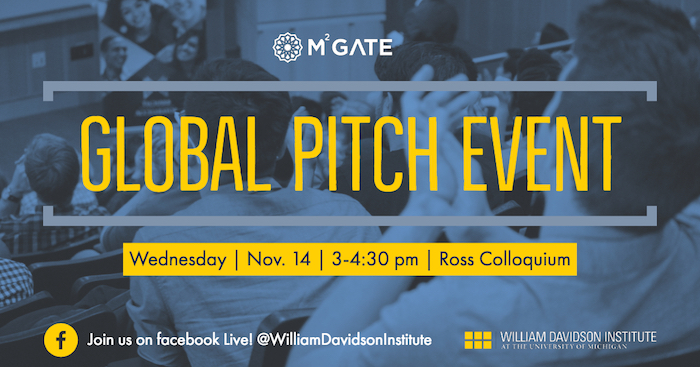
Before participating in WDI’s M²GATE Program, University of Michigan sophomore Jackie Spryshak said she had never met anyone from Egypt. Over eight weeks this summer, Spryshak worked with and got to know her teammates from Egypt as they collaborated on their winning social enterprise project as part of the M2GATE virtual exchange program.
On Nov. 14, her Egyptian teammates will travel to Ann Arbor for a pitch competition at the Ross School of Business where they will meet for the first time. In all, 12 students from the MENA region will travel to U-M – six from Egypt and three each from Morocco and Tunisia. Four of the U-M-based students come from the Ann Arbor campus and one attends the Dearborn campus. (Click here to RSVP to attend the event in person. It also will be streamed on Facebook Live. Click here to RSVP on Facebook.)
“I am so proud that our team worked so hard and I am thrilled to be able to meet these students in person,” she said. “I am in awe of the creativity and drive behind my teammates, and can’t wait to see them.”
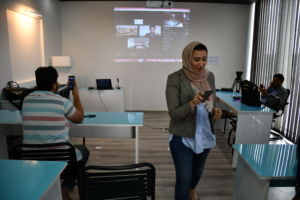
Spryshak and her teammates from Egypt were among the more than 500 students who participated in the WDI-organized program MENA-Michigan Initiative for Global Action Through Entrepreneurship (M²GATE), which paired undergrads from five Michigan campuses with peers in Egypt, Libya, Morocco and Tunisia to find entrepreneurial solutions to social challenges in the Middle East and North Africa (MENA) region. Working virtually, teams developed social entrepreneurship projects and accompanying pitches over an eight-week period with the help of instructors, mentors, and successful entrepreneurs from MENA and Michigan.
At the end of each of the three cohorts, the program hosted a virtual competition with judges naming winners based on scalable solutions featuring science, technology, engineering, and math – or STEM-based – innovations. The winning team from each cohort will participate in the pitch competition at U-M.
At the Nov. 14 event, each team will have about 5-7 minutes for their presentation before a panel of five judges that includes Ross School entrepreneurship professors and startup consultants. The event begins at 3 p.m. in the Ross School Colloquium on the sixth floor. It will be live streamed; details will be provided later. Light refreshments will be served at the conclusion, around 4:30 p.m.
Here are the videos from the three winning teams about their proposed social enterprises.
The Stevens Initiative is an international effort to build global competence and career readiness skills for young people in the United States, the Middle East and North Africa; it is funded by several public and private donors including the U.S. Department of State and the Bezos Family Foundation.
From 2017-2019, the M²GATE program brought together more than 400 students from five Michigan university campuses and their peers in Egypt, Libya, Morocco and Tunisia. Harnessing the power of virtual exchange, students worked in teams to find entrepreneurial solutions to social challenges in the Middle East and North Africa (MENA) region, while learning new skills, building cross-cultural experiences and forging new relationships. Students developed their business concepts over an eight-week period and judges determined the winning team from each of the three cohorts. M²GATE culminated in a visit by the winning teams to Ann Arbor to participate in a week of entrepreneurial activities, including a business pitch competition, in November 2018.
Student feedback was overwhelmingly positive, with participants praising the program for helping them work with people in different cultures and exposing them to new concepts in design thinking, entrepreneurship, leadership and virtual collaboration. The program also sparked in students a deep interest in social enterprise – 51% of program participants said they planned to take what they’ve learned and start a social enterprise in the future. The program was funded by the Stevens Initiative at the Aspen Institute, with support from the U.S. Department of Statement and a consortium of other partners
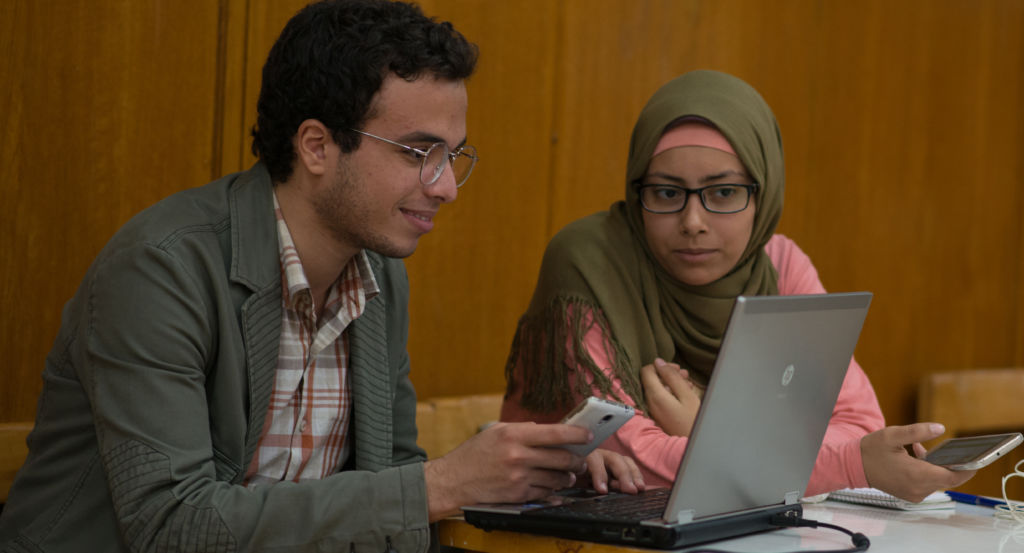
Abanoub Montaser Rodolf of Cairo recently was part of a winning team at a prestigious science competition in Indonesia. But he credits his success there to what he learned earlier in the spring from Ann Arbor.
Rodolf was one of more than 500 students who participated in the WDI-organized program MENA-Michigan Initiative for Global Action Through Entrepreneurship (M²GATE), which paired undergrads from five Michigan campuses with peers in Egypt, Libya, Morocco and Tunisia to find entrepreneurial solutions to social challenges in the Middle East and North Africa (MENA) region. Working virtually, teams developed social entrepreneurship projects and accompanying pitches over an eight-week period with the help of instructors, mentors, and successful entrepreneurs from MENA and Michigan.
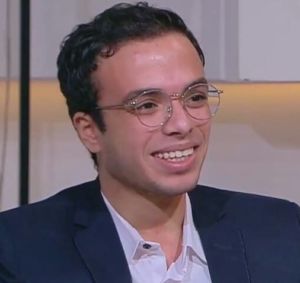 The program culminated in a virtual competition, and judges looked for scalable solutions that feature science, technology, engineering, and math – or STEM-based – innovations. Among the benefits of the program were that it increased cross-cultural understanding and equipped young people with the skills needed to thrive in a 21st century economy.
The program culminated in a virtual competition, and judges looked for scalable solutions that feature science, technology, engineering, and math – or STEM-based – innovations. Among the benefits of the program were that it increased cross-cultural understanding and equipped young people with the skills needed to thrive in a 21st century economy.
Rodolf, a student at Higher Technological Institute, was part of M²GATE’s second cohort and was on a team with three fellow Egyptians and two University of Michigan students – one each from the Ann Arbor and Dearborn campuses. His team, called the Sustainablers, developed an app that linked those looking to dispose of electronic waste with people interested in either buying or recycling it. The Sustainablers finished second out of 28 teams with their video pitch, which is below. (WDI will host a pitch competition with the winning teams from the three cohorts on Nov. 14 at U-M’s Ross School of Business.)
Last month, Rodolf was selected by Egypt’s Academy of Scientific Research and Technology as one of five delegates to represent the country at the 12th Asian Science Camp in Manado, Indonesia. The camp brings together talented, young scientists from 30 countries to share their ideas and projects in Asia and meet Nobel laureates and distinguished scientists. To be selected, Rodolf went through long screening and interview processes against top high school and college undergraduate students.
Rodolf credits M²GATE with preparing him for this tough evaluation exercise.
“The skills of thinking critically from diverse perspectives that I gained from M²GATE helped me to be different from the other applicants from all over Egypt,” he said.
https://www.youtube.com/watch?time_continue=27&v=boUSQb4YeOw
At the science camp, Rodolf was put on a team with students China, Japan, Thailand and Indonesia for a competition. They worked on a project to recycle plastic waste. The judges – including a Nobel laureate – chose the team’s project as the best.
Again, Rodolf credits the M²GATE program with giving him the tools to do well in the competition.
“I really appreciate the skills of collaborating and communicating and crossing cultures that I learned in M²GATE, which helped me so much to lead” my science camp team, he said.
Since his win at the camp, Rodolf has been interviewed by Egyptian reporters in print and twice on television. He said the M²GATE “changed my life to the best.”
He said he is thankful “for every single thing I’ve learned in this program because I really have benefited from everything I’ve learned.”
The Stevens Initiative is an international effort to build global competence and career readiness skills for young people in the United States, the Middle East and North Africa; it is funded by several public and private donors including the U.S. Department of State and the Bezos Family Foundation.
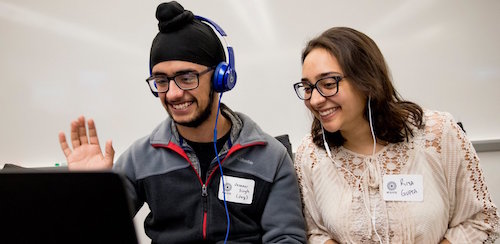
University of Michigan students chat during an M2GATE virtual exchange session.
A Washington, D.C. forum on the positive impacts virtual exchange programs can have on communities and young people worldwide included a panel discussion featuring Amy Gillett, vice president of WDI’s Education initiative.
The forum, “Inspiriting Civic Engagement through Virtual Exchange,” was sponsored by the Stevens Initiative and hosted by the Aspen Institute. It was held May 17-18. The panel discussion is featured below and begins at the 1:23:10 mark.
Gillett discussed WDI’s work this year with the Stevens Initiative on the MENA-Michigan Initiative for Global Action Through Entrepreneurship (M²GATE) program. For the first two cohorts, WDI recruited 111 students from three Michigan universities ― University of Michigan, Wayne State University and Eastern Michigan University ― and 223 of their peers from the participating Middle East and North Africa (MENA) region countries of Egypt, Libya, Morocco and Tunisia. The third and final cohort began May 25 with 60 Michigan students and 151 MENA students enrolled.
For the project, the Michigan-based students were paired with their Middle East counterparts to find entrepreneurial solutions to social challenges in the MENA region. Working virtually, teams of six developed social entrepreneurship projects and accompanying pitches over an eight-week period. Guiding them along the way were instructors, mentors, and successful entrepreneurs from MENA and Michigan. The teams coordinated times for virtual group work and produced a pitch video as a final assignment.
Gillett was joined on the panel by Jennifer Chen of World Learning and Victor Eno of Florida A&M University, leaders at two other organizations that also implemented virtual exchange programs in partnership with the Stevens Initiative. The three discussed why it is important for young people to be active participants in their communities, what they can learn about civic engagement from their global peers and how virtual exchange programs can advance participation.
“This program fundamentally changes participants’ point of view on their role in society by helping them realize that they can be the ones to address issues in society instead of waiting for the government or some other entity to take action, Gillett said. “Some of our participants are starting to refer to themselves as ‘changemakers’ and I think that’s an apt description.”
The Stevens Initiative is an international effort to build global competence and career readiness skills for young people in the United States, the Middle East and North Africa; it is funded by several public and private donors including the U.S. Department of State and the Bezos Family Foundation.